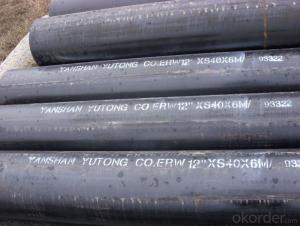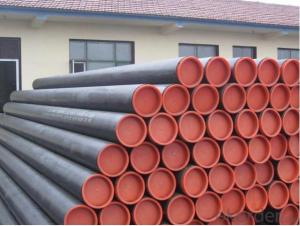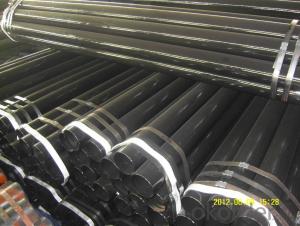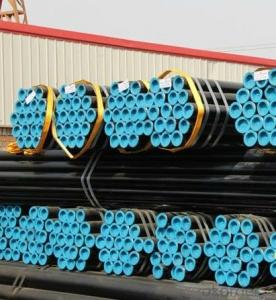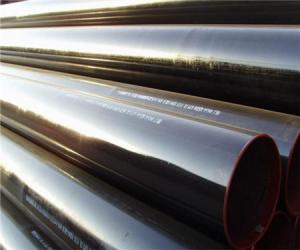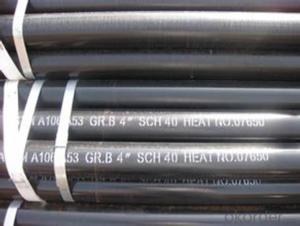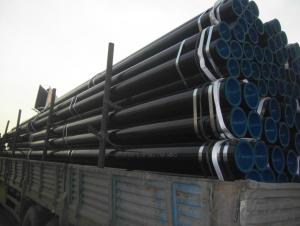ASTM A106 Gr.B Seamless Steel Pipe
- Loading Port:
- China Main Port
- Payment Terms:
- TT OR LC
- Min Order Qty:
- -
- Supply Capability:
- -
OKorder Service Pledge
OKorder Financial Service
You Might Also Like
O.D | O.D tolerance | W.T | Thickness Tolerance |
1/2-12'' | ±0.3mm | 1.5-12 MM | ±8% |
Length | 3m,4m,5.8m,6m or according customers' requirements | ||
Certificate | ISO9001-2008,EN10210,API,Raw material cert,Mill cert,Reap on site inspection report,SGS,BV | ||
Standard | ASTM A53/ASTM A36 BS1387/BS1139/EN39/EN10219/EN10217/EN10297/EN10296/EN10025 etc | ||
Material | Q195/215/235/345, SS330/400/500, S235JR/S235JQ/S235J2, etc | ||
Inspection | With Hydraulic Testing, Eddy Current , Infrared Test, etc | ||
Technique: | Welded Hot rolled,heat extrusion | ||
Packing | in bundle or in bulk, PVC in blue or in strip | ||
Usage | For construction, Pluid and Greenhouse | ||
Main market: | Middle east,North and South America, East and West Europe, South and southeast Asia,Australia,Africa, | ||
Place of Origin | China | ||
HS code: | 73063090 | ||
Productivity | 2000Ton/Month | ||
Processing | galvanzied,inner and outer stab clean,bevelled oiled,painted black threading,with coupling and plastic caps protected packing in plastic cloths,3PE,FBE,corrosion resistant coating | ||
- Q: When can I use the PVC pipe and when to use the galvanized pipe?
- Galvanized pipes are generally used outside the drying environment or building blocks, and PVC is mainly used for pre embedding in walls or humid environments. If in the ceiling ceiling, below the roof, you need to use galvanized pipe, in the floor below, on the ground you need to use PVC.
- Q: What is the maximum length of steel pipes available?
- The maximum length of steel pipes available can vary depending on the manufacturer and specific application. However, steel pipes can typically be found in lengths ranging from 20 feet (6 meters) to 40 feet (12 meters) or even longer in some cases.
- Q: How are steel pipes insulated to prevent heat gain?
- Steel pipes are insulated to prevent heat gain by using materials with low thermal conductivity, such as fiberglass or mineral wool, which are wrapped around the pipes. This insulation layer acts as a barrier, reducing the transfer of heat from the surroundings to the pipes, thereby minimizing heat gain. Additionally, a vapor barrier may be applied over the insulation to prevent moisture ingress, which could further impact the insulation's effectiveness.
- Q: Can steel pipes be used for nuclear power plants?
- Yes, steel pipes can be used for nuclear power plants. Steel pipes are commonly used in the construction of nuclear power plants for various purposes such as transporting coolant, steam, and other fluids. Steel pipes offer excellent strength, durability, and resistance to high temperatures and pressure, making them suitable for the demanding conditions of nuclear power plants.
- Q: How are steel pipes repaired if they are damaged?
- Steel pipes can be repaired if they are damaged through various methods such as welding, patching, or replacing the damaged section with a new pipe. The specific repair technique depends on the extent and nature of the damage.
- Q: Can steel pipes be recycled after their useful life?
- Steel pipes can indeed be recycled once they have served their purpose. Steel, being an incredibly recyclable substance, can be recycled even in the form of pipes. The recycling of steel pipes entails the collection of used pipes, followed by thorough cleaning to eliminate any impurities, and finally transforming them into fresh steel products. This recycling process contributes to the preservation of natural resources, curbs energy usage, and limits waste generation. Moreover, recycling steel pipes aids in mitigating the environmental repercussions linked to the manufacturing of new steel.
- Q: Where is the difference between seamless steel pipe and welded pipe?
- In appearance, seamless steel pipe and welded steel pipe difference in the welded pipe wall welded tendons, and seamless No.
- Q: How do you repair a damaged steel pipe?
- To repair a damaged steel pipe, the first step is to identify the extent of the damage. If the damage is minor, it can be fixed using a pipe repair clamp or a stainless-steel wrap. For larger damages, a cut and replace method may be necessary, where the damaged section is cut out and replaced with a new piece of pipe. In some cases, welding or soldering techniques may be required. It is important to consult with a professional plumber or pipe repair specialist to ensure the correct repair method is used for the specific situation.
- Q: What is the typical lifespan of steel pipes?
- The typical lifespan of steel pipes can vary depending on various factors such as the quality of the steel, the environment they are exposed to, and the maintenance and care they receive. However, on average, steel pipes can have a lifespan of anywhere between 20 to 100 years or more.
- Q: What are the different types of steel pipes?
- There are several different types of steel pipes, including seamless steel pipes, welded steel pipes, galvanized steel pipes, and stainless steel pipes.
Send your message to us
ASTM A106 Gr.B Seamless Steel Pipe
- Loading Port:
- China Main Port
- Payment Terms:
- TT OR LC
- Min Order Qty:
- -
- Supply Capability:
- -
OKorder Service Pledge
OKorder Financial Service
Similar products
Hot products
Hot Searches
Related keywords
